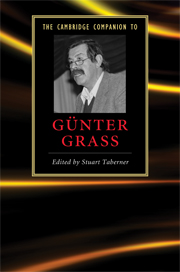Book contents
- Frontmatter
- Introduction
- 1 Biography as politics
- 2 Günter Grass’s political rhetoric
- 3 The exploratory fictions of Günter Grass
- 4 Günter Grass and magical realism
- 5 Günter Grass’s ‘Danzig Quintet’
- 6 Günter Grass and gender
- 7 Authorial construction in From the Diary of a Snail and The Meeting at Telgte
- 8 Günter Grass’s apocalyptic visions
- 9 Günter Grass and German unification
- 10 Günter Grass’s Peeling the Onion
- 11 Günter Grass as poet
- 12 Günter Grass and art
- 13 Günter Grass as dramatist
- 14 Film adaptations of Günter Grass’s prose work
- 15 Günter Grass and his contemporaries in East and West
- Guide to further reading
- Index
8 - Günter Grass’s apocalyptic visions
Published online by Cambridge University Press: 28 January 2010
- Frontmatter
- Introduction
- 1 Biography as politics
- 2 Günter Grass’s political rhetoric
- 3 The exploratory fictions of Günter Grass
- 4 Günter Grass and magical realism
- 5 Günter Grass’s ‘Danzig Quintet’
- 6 Günter Grass and gender
- 7 Authorial construction in From the Diary of a Snail and The Meeting at Telgte
- 8 Günter Grass’s apocalyptic visions
- 9 Günter Grass and German unification
- 10 Günter Grass’s Peeling the Onion
- 11 Günter Grass as poet
- 12 Günter Grass and art
- 13 Günter Grass as dramatist
- 14 Film adaptations of Günter Grass’s prose work
- 15 Günter Grass and his contemporaries in East and West
- Guide to further reading
- Index
Summary
'War always raged whether it was close to home or far away', Grass stated in his opening speech 'The War Has Run Out of Steam', held at the 2006 International Pen Congress in Berlin. A world perpetually void of peace, he continues, sets the moral and literary agenda for authors: 'We authors are late bloomers . . . because events that happened and continue to happen . . . never quit escaping us. What historians are willing to write off, remains present to us.' While Grass is reacting specifically to the invasion of Iraq in 2003 in this speech, his principal argument that writers are charged with the task of accounting for individual suffering and of taking those in power to court for their lies, profiteering or megalomania characterises his entire oeuvre. Guilt and responsibility, be they of nations or of citizens, are the twin forces Grass does battle with, and in each of his four major works written in the decade between 1980 and 1990, Headbirths or The Germans Are Dying Out (1980), The Rat (1986), Show Your Tongue (1988), and Dead Wood: An Epitaph (1990), he depicts how (West) Germany and Third World countries engage with the political, economic, social and cultural conditions of late capitalism. Not only is the spectrum of problems addressed daunting, ranging from the abject poverty of the metropolitan slums belts in India or Indonesia, worldwide ecological devastation, threat of atomic annihilation to the spiritual malaise of prosperous West Germans or their dismal politicians, but Grass also experiments with time-frames and narratives styles that dislodge traditional genre patterns.
- Type
- Chapter
- Information
- The Cambridge Companion to Günter Grass , pp. 111 - 124Publisher: Cambridge University PressPrint publication year: 2009

